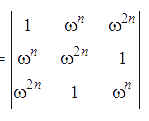With 1,ω,ω2 as cube roots of unity, inverse of which of the following matrices exists?
[1ωωω]
[ω211ω]
[ωω2ω21]
None of these
The correct Answer is:D
To determine the existence of the inverse of the given matrices with cube roots of unity 1,ω,ω2, we need to calculate the determinant of each matrix. The inverse of a matrix exists if and only if its determinant is non-zero.
Step 1: Understand the properties of cube roots of unity
The cube roots of unity satisfy the following properties:
1. 1+ω+ω2=0
2. ω3=1
Step 2: Calculate the determinant of each matrix
Matrix 1:
A1=[1ωωω2]
The determinant is calculated as:
det(A1)=(1)(ω2)−(ω)(ω)=ω2−ω2=0
Matrix 2:
A2=[ω211ω]
The determinant is calculated as:
det(A2)=(ω2)(ω)−(1)(1)=ω3−1=1−1=0
Matrix 3:
A3=[ωω2ω21]
The determinant is calculated as:
det(A3)=(ω)(1)−(ω2)(ω2)=ω−ω4
Since ω4=ω (because ω3=1), we have:
det(A3)=ω−ω=0
Step 3: Conclusion
Since the determinants of all three matrices are zero, none of the matrices have an inverse.
Final Answer
The inverse of none of the matrices exists.
---
The cube roots of unity satisfy the following properties:
1. 1+ω+ω2=0
2. ω3=1
A1=[1ωωω2]
The determinant is calculated as:
det(A1)=(1)(ω2)−(ω)(ω)=ω2−ω2=0
A2=[ω211ω]
The determinant is calculated as:
det(A2)=(ω2)(ω)−(1)(1)=ω3−1=1−1=0
A3=[ωω2ω21]
The determinant is calculated as:
det(A3)=(ω)(1)−(ω2)(ω2)=ω−ω4
Since ω4=ω (because ω3=1), we have:
det(A3)=ω−ω=0
Since the determinants of all three matrices are zero, none of the matrices have an inverse.
The inverse of none of the matrices exists.
Topper's Solved these Questions
- MATRICES BOOK - ARIHANT MATHS ENGLISHCHAPTER - MATRICES EXERCISE - Exercise For Session 4
9 Videos
- MATRICES BOOK - ARIHANT MATHS ENGLISHCHAPTER - MATRICES EXERCISE - Exercise (Single Option Correct Type Questions)
30 Videos
- MATRICES BOOK - ARIHANT MATHS ENGLISHCHAPTER - MATRICES EXERCISE - Exercise For Session 2
19 Videos
- MATHEMATICAL INDUCTION BOOK - ARIHANT MATHS ENGLISHCHAPTER - MATHEMATICAL INDUCTION EXERCISE - Exercise (Questions Asked In Previous 13 Years Exam)
2 Videos
- MONOTONICITY MAXIMA AND MINIMABOOK - ARIHANT MATHS ENGLISHCHAPTER - MONOTONICITY MAXIMA AND MINIMAEXERCISE - Exercise (Questions Asked In Previous 13 Years Exam)
29 Videos
Similar Questions
Knowledge Check
If 1,ω,ω2 are cube roots of unity then the value of (2+2ω−3ω2)3 is
A125B−125C27D−27If 1,ω,ω2 are cube roots of unity then the value of (5+2ω+5ω2)3 is
A27B−9C−27D−81If 1,ω,ω2 are cube roots of unity then the value of (3+5ω+3ω2)3 is
A6B8C12D16
If 1,ω,ω2 are cube roots of unity, prove that 1,ω,ω2 are vertices of an equilateral triangle
View SolutionIf ω is a cube root of unity, then
ω3= ……
View SolutionIf ω is a cube root of unity, then
1+ω2= …..
View SolutionIf ω is a cube root of unity, then
ω+ω2=…..
View SolutionIf 1,ω,ω2 are three cube roots of unity, prove that
(1+ω2)4=ω
View Solution

